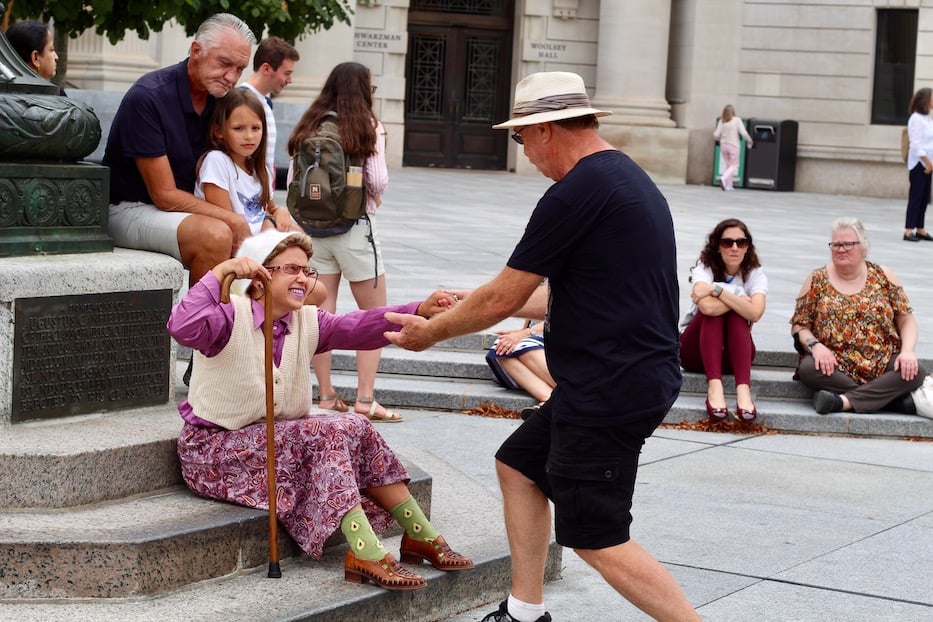
Circus | Dance | Arts & Culture | Yale Schwarzman Center
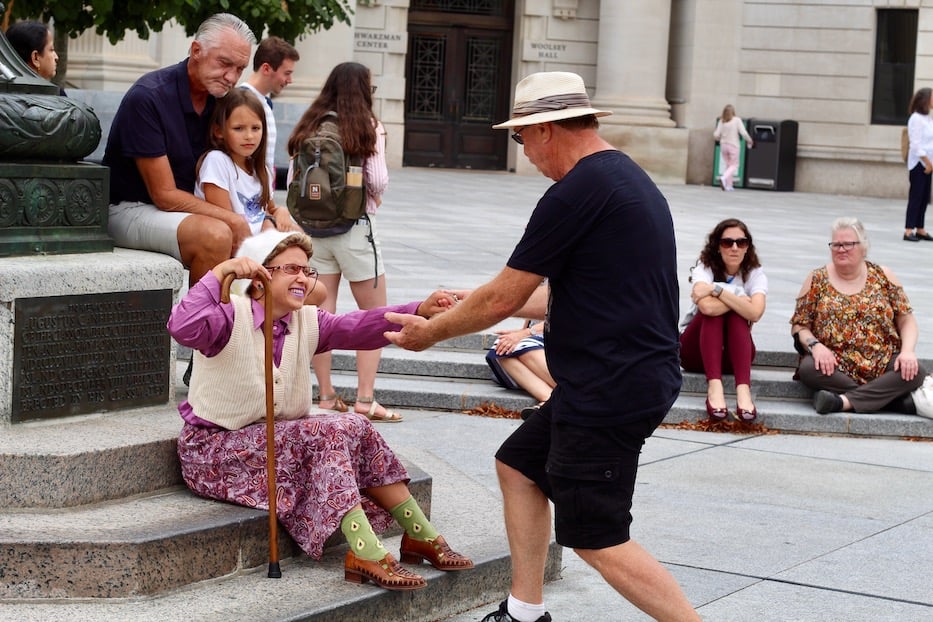
31-year-old Elysia McMullen as Granny Frieda. Stamos and Maxine are to her left. Lucy Gellman Photos.
The old woman had already started making her way across the wide plaza, the slabs of stone sturdy beneath her loafers, when 7-year-old Maxine Sciarro noticed her purple lipstick and burst into a smile. Beside her, doting grandfather Gregory Stamos savored the moment, one of the last before sending her off to the second grade. The music swelled around them, with bursts of French jazz that melted into 1980s rock.
Laughter, play, and a sweet end to summer vacation came to downtown New Haven Tuesday afternoon, as the clowning duo Bill and Fred arrived at the Hewitt Quadrangle outside the Beinecke Rare Book & Manuscript Library and Yale Schwarzman Center with “The Grannies.” The jovial brainchild of Elysia McMullen and Luisa Schmitz—or Frieda and Billie, as their sobriquets would have it in the show—the performance both pays homage to elders and reminds all of its viewers that humor can be a balm, sometimes with few or no words at all.
By the end of 30 minutes Tuesday, it had doubled as a reminder of the importance of human connection, however fleeting or unexpected. Close to three dozen attended, many nibbling on complementary ice cream sandwiches and lemon sorbet as they watched.
“I think sometimes as we grow older, we forget our imagination, our childhood play,” said McMullen, who appeared Tuesday as a solo performer after Schmitz ran into an unforeseen conflict. “When you look at children, they’re consistently at play. Then we become adults, and we lose that.”
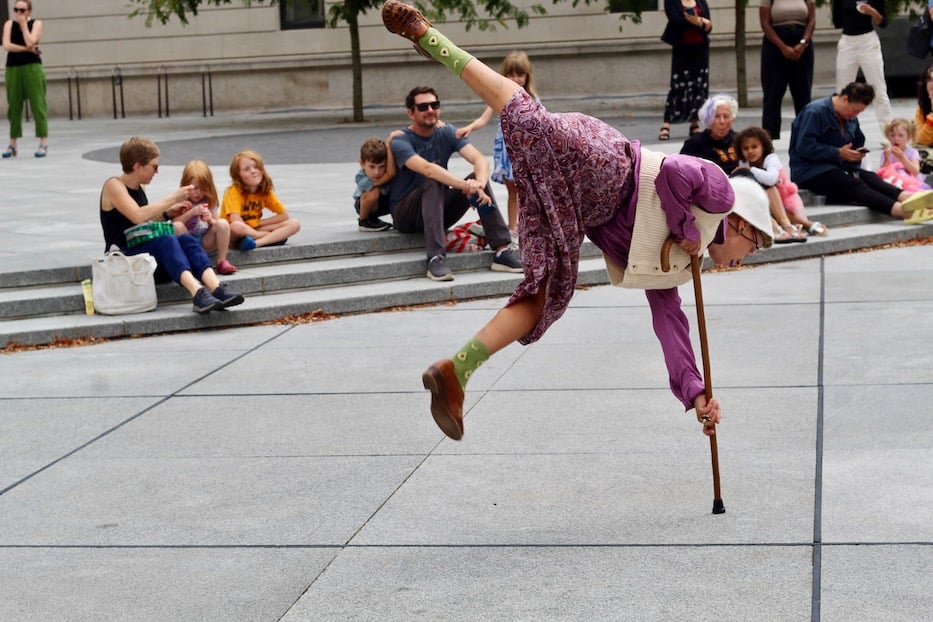
Except, of course, when they don’t. After meeting each other at the Fontys Hogeschool voor de Kunsten in the Netherlands, McMullen and Schmitz started creating work around clowning, dance, and circus performance, including several early sketches that became the backbone of their current work. Both find humor “really important,” McMullen said, describing it as a door to both more expansive thinking and audience interaction.
“The Grannies” was born during the first years of the Covid-19 pandemic, as a direct response to the intense and sometimes deadly isolation that elders were facing across the globe. As they built the performance, McMullen and Schmitz talked to elders, getting feedback on everything from the way they dressed to the way they moved. They studied elders’ physicality, working to blend it with their own quirky, expressive and unexpected motion.
Often, McMullen was most delighted by how bold and brash elders felt they could be around Bill and Fred. “Elderly people are very similar,” she said—except they have lived enough years to stop caring so much about what other people thought of them. She loved that.
As McMullen began to move through the heavy, humid air Tuesday afternoon, attendees could see that in real time. At first, friends and young families gathered slowly around the plaza, several pint-sized viewers crouching on the stairs. Music crackled from an old radio McMullen had set nearby, and for a moment it seemed to be coming straight from the ground itself.
For a moment, conversations continued around the space, friends catching up as they tucked into ice cream sandwiches and lunches they had carried outside. At some point, people noticed Frieda, who had begun to hobble through the space in a felted white hat, purple lipstick, flower-patterned violet skirt and matching silk blouse. She was small, but strong, with an outsized presence that brought attention to the patch of paving that she had made her own.
Leaning forward on her cane, she half-hopped over the plaza, hunched enough to show off a pair of cotton socks patterned with avocados. It was a laugh line without any words at all.
Taking her time, she looked out into the audience, trying to size up audience members that she might be able to pull into the routine. One, a Yale hospitality worker who couldn't have been more than 20, pulled his hands to his chest as if to say Who, me? Another, real-life "Outraged Elder" Melinda Tuhus looked on, beaming as she followed each step. With a slight tremor in her wrist, Frieda headed toward the plaza’s colonnade, perhaps to rest her body for a moment.
She had just made it over to Stamos and Maxine, who sat perched beneath Hewitt’s high flagpole, when she reached out, tried a few steps, then stumbled into an exaggerated fall, stretching her arms and legs across the brick. Stamos reached toward her, in that way people ask after each other without words. When she reached immediately back, Maxine smiled immediately.
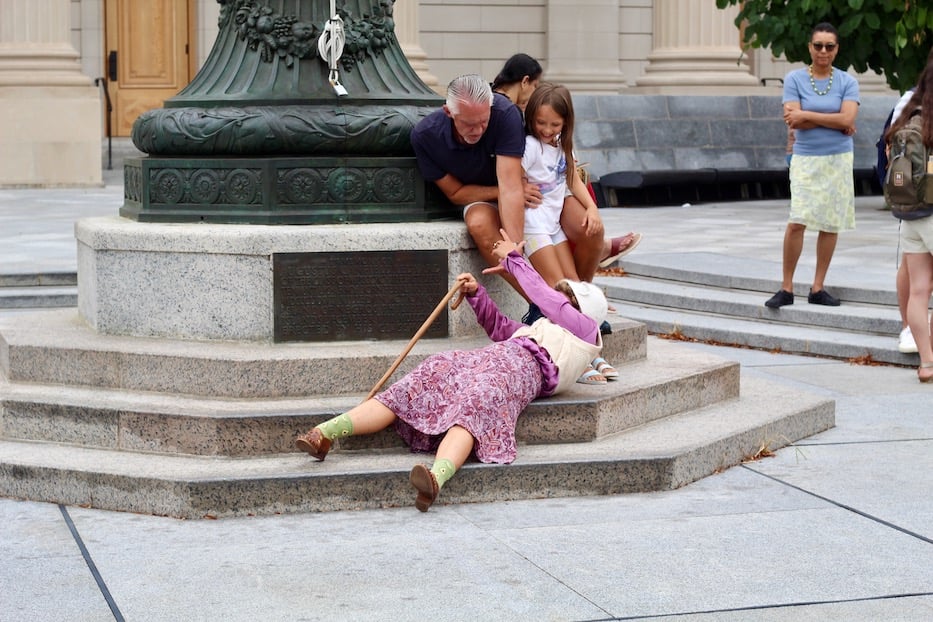
Moments later, she extended her cane, rotated her body, and pulled off a sustained balance that reminded viewers of how lithe and limber Frieda could be (and also, that age is not a death sentence). To applause from the audience she was back on her feet, half-gliding across the plaza when she stopped, and listened carefully to the audio crackling around her. She sank into a slow, low crouch, ears pricked for strains of French jazz that floated on the breeze.
Then, just as methodically, she rose and began to dance with her cane. She jumped around it, running for attendees before raising her arms and struggling her shoulders as if to say, Not worth the fuss. She skipped forward, her body trembling on her cane. As the music shifted, she began to dance, using the cane as a prop and a balance.
Bonnie Tyler’s “Holding Out For A Hero” wove through the space, and Frieda moved to the beat. Drawing giggles, she began to run in circles around the cane, gathering speed as she leapt and clicked her heels. As her cane fell to the ground, she mimed a fall, arms windmilling, and began to pull herself across the ground. Before rising completely, she angled her cane, and began to walk in slow circles around it. Cheers and applause erupted across the circle. She flexed her bicep, and then approached an attendee who took her by the hand.
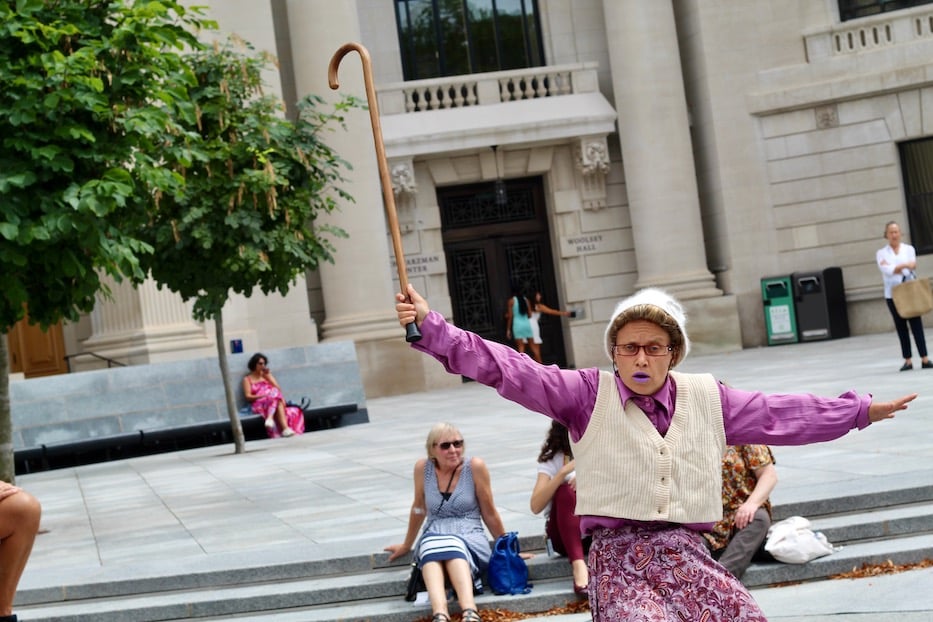
It primed the audience for the final piece of her act, in which she slipped off a ring, and looked around the quadrangle while calling out a single name as if she was looking for something. For anyone who has watched a family member spiral into loneliness or dementia, it was a character study done right: Her voice, swallowed up in the warm air, quivered before falling silent.
Then, just as quickly, the spell was broken, and Frieda had decided she wanted a sweet treat. Acknowledging the audience, she began to make her way toward an ice cream cart, inviting them to come along with her. Within minutes, the crowd had dispersed, and time was again passing just as it had before.
Back at the flagpole, Stamos and Maxine were still floating from the performance. After reading about it in the newspaper, Stamos thought it would be a fun way to spend the day together—particularly before Maxine heads to second grade on Wednesday. Before the performance, they’d gone to the Beinecke, where Stamos had taught his granddaughter the word “translucent” for the first time.
“I liked it!” Maxine said enthusiastically, glitter shining on her shirt as she spoke. Stamos—or as Maxine refers to him, Papu—added that he was grateful for free activities that encouraged laughter, often without a spoken prompt.
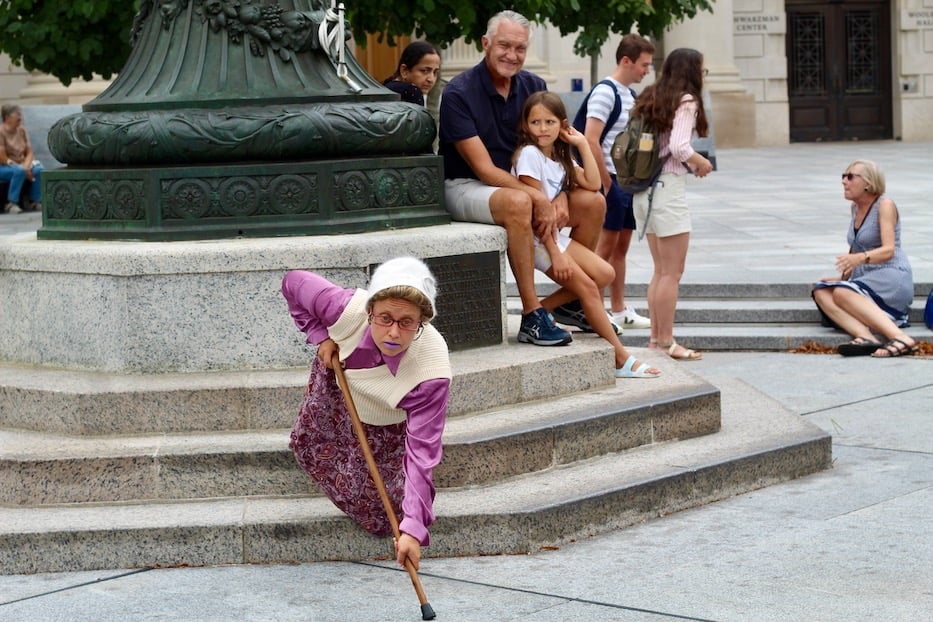
“It’s a good way to end the summer,” he said as the two hopped off the colonnade, on to the next adventure of the day. “We try to expose them to more than videos and television.”
In an interview following the performance, McMullen said that the performance has made her think differently about the aging process, including the possibility of performing as long as her body will allow her to do it. While she is currently only 31, her character Frieda “really varies,” she said—sometimes she thinks she’s 12, and other days she feels every one of her 75 or 80 years.
In that sense, “The Grannies” is not a send-up or a parody, but a love letter, designed with audiences of all ages in mind. When Frieda reaches out to members of the audience—in Tuesday’s case, on a campus known for fear mongering more than its particular warmth—it’s with a complete sense of sincerity, as if to pass on everything she’s learned before it’s too late. "Elders hold our history and hold our past,” she said.
“Even though a body ages and gets more fragile, I still want to push through physically,” she added. “Age is just a number. It’s more about our mind.”

